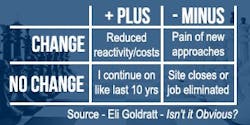Matt, I&C specialist, Michigan
Answer: I see this frequently, not just with planning and scheduling but in all functions that are transitioning as the organization works to become more proactive and reliability-centered. Think about it. Surely everyone would like to eliminate firefighting and chaos. Reactivity is frustrating. People are more likely to get hurt in reactive environments. It has to be an obvious choice, right? No, it’s not.
Ask a group if people resist change and every hand in the room will rise. Heads will quickly nod in affirmation. Yet the reality is that people change all the time. If you have gotten married, had children, and bought a house, you have experienced several life-changing events right there. People resist change only when they have a good reason for doing so.
Typically, resistance to change comes from change agents focusing only on the benefits of change and the downfalls of not changing. These two components are only half the picture. There are downfalls to changing and benefits of not changing, too. You have to be able to address all four components.
When you start attempting to change behaviors, there are some things to consider.
- Paint the picture of the future state. Address the pluses and minuses of changing and not changing. Think about what’s in it for your team members so that they see that the benefits of changing outweigh those of not changing.
- Educate people on the steps it will take to get there. Have a strategic plan and communicate, communicate, communicate. We tend to grossly undercommunicate.
- Realize that the people on the floor feel the impact of every management initiative passed down. Organizations often have multiple initiatives ongoing at any one time, and resource requirements for each one often overlap. Get the people on the floor involved in the process so they don’t feel that it’s pushed down their throats. People buy in to what they help create.
- Demonstrate leadership. Set expectations and hold yourself accountable along with others. Sharpen your focus; be decisive; and act. Realize that everyone is watching you and paying attention to everything you do or say. The first observation of you doing something other than what you said the team should do can destroy the effort.
- Don’t waste a lot of time. Leverage coaching and mentoring for yourself and the team to minimize false starts and detours off the proven path. You aren’t the first one to travel this path of planning and scheduling (AKA work execution management).
What are your thoughts? Do you find people resistant to change? What have you done that has proved successful in overcoming this issue? Please post your comments or questions.
Talk soon,
Jeff Shiver, CMRP
If you have questions in the fields of maintenance, reliability, planning and scheduling, MRO storerooms, or leadership as examples, please contact Jeff Shiver with your question(s) here.



